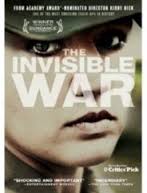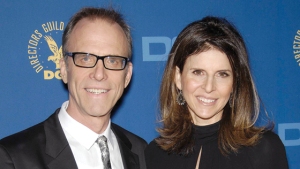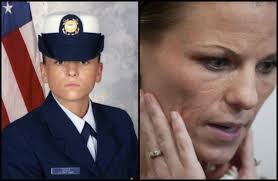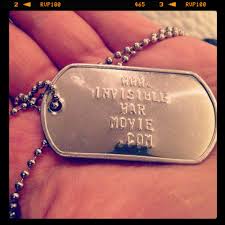” I felt horrified, I felt angry, I felt sad,” says one of the women interviewed in THE INVISIBLE WAR.
 You may feel the same after watching this hard-hitting documentary directed by Kirby Dick (This Film Is Not Yet Rated ) and co-written and co-produced by Amy Ziering (The Hunting Ground ).
You may feel the same after watching this hard-hitting documentary directed by Kirby Dick (This Film Is Not Yet Rated ) and co-written and co-produced by Amy Ziering (The Hunting Ground ).
Journalist Amy Herdy (“Betrayal in the Ranks”) estimates over half a million women have been sexually assaulted in the US military.
Retired Brigadier General Loree Sutton, now a psychiatrist with the U.S. Army, says military sexual trauma is not limited to women. Russell Strand, Chief, Family Advocacy Law Enforcement Training Division, US Army estimates 20,000 men have been raped in the past year alone. One man recalls being struck from behind and held down by two assailants while a third violated him from behind. Another man interviewed on-screen says that years after the assault on his person took place “I can still hear them laughing.” (Men often do not report it because of the culture of masculinity in the military and the specter of homophobia.)

However, the overwhelming majority of victims of rape are female.
The irony is that the women interviewed for this film were initially enthused about their chosen career and “the opportunity to serve my country”.
US Navy vet Hannah Sewell recalls being “excited and completely hyped-up about going and all my family was really proud of me …. “. That was before she was locked in a hotel room and raped by a fellow recruit.
US Coast Guard recruit Kori Cioca recounts her ordeal at the hands of a superior officer. ( “He screamed at me and he made me come in. He grabbed my arm …. and he raped me in his berthing area.”)

Some of the women interviewed suffered physical injuries. Ms. Cioca suffered horrendous pain from a dislocated jaw after being hit in the face by the officer (“I have been on a soft diet for five years now. Everything is mashed potatoes, Jell-O … when it’s really cold, my jaw will just lock up.”) Ms, Sewell tells the camera: “My main nerve in my spine was pinched and my hips were rotated. I could barely walk. I had collapsed due to muscle spasms in my back, because my back was injured in the rape.”

All of the women interviewed still bear the psychological scars.
Attempting redress for the injustice can be a soul-shattering experience. Attorney Susan Burke tells an interviewer: “What we hear again and again that as bad as it was being raped, what was as bad, if not worse, was the professional retaliation in their chosen career.”
“When you report something you’d better be prepared for the repercussions,” warns Theresa Verderber-Phillips, US Army. “If a man is accused of rape, it is a set-up. The woman’s lying.”
One woman reported it to her squad leader “and he said there was nothing he could do about it because he didn’t have any proof. ” Instead she was charged with adultery because he was married and she was not.
Another woman recalls threats to her life. (“They made it very clear that if I said anything they were going to kill me.”)
Because of the chain of command and the military system of justice the accounts of the survivors of rape were often left unheard.
The screen flashes some alarming statistics: ” 33 % of servicewomen didn’t report their rape because the person to report to was a friend of the rapist …. 25% of servicewomen didn’t report their rape because the person to report to was the rapist.”
The film also shows the effects of the sexual assault on the home lives of the survivors in, for example, interviews with Ms. Cioca’s husband, US Coast Guard officer Rob McDonald.
Ms. Herdy says she has met other sufferers from post-traumatic stress disorder but she has never met anyone with the kind of severe PTSD symptoms as survivors of sexual assault in the US military.
“It’s akin to what happens in a family with incest,” says Brig. Gen Sutton, ” because, you know, in the military
when we are functioning at our best in a cohesive unit, with brothers and sisters, I mean, we are family. When that bond of trust is violated the wound penetrates to the inner part of one’s soul, one’s psyche. “
The options open to women who have been assaulted have been historically bleak, according to Myla Hader, U.S. Army Criminal Investigations. “I was in the army about seven or eight years before anything happened to me. I was raped by another CID agent who was senior to me … There’s no way out of it. There are only three options: suicide, AWOL or deal with it.”
Small wonder that, as the film points out, many survivors fall into depression, drug abuse, alcohol, are unable to hold jobs and end up on the streets.
In Dec. 2011 a class action lawsuit launched by some of the survivors was dismissed. In its ruling, the Court said, and I quote from the film, “rape is an occupational hazard of military service.”
“It’s not just a women’s issue, It’s not just something the military has to deal with. ” says Brigadier-General Sutton. “But as a society we’re all in this together.”
 The Invisible War won an Independent Spirit Award and was nominated for an Oscar in the Best Documentary category in 2013. Despite this I was unable to find the film at any of my neighborhood video stores. Thanks to Netflix I finally managed to see it. For more information on this subject (and to find out how viewers can take action) log onto notinvisible.org.
The Invisible War won an Independent Spirit Award and was nominated for an Oscar in the Best Documentary category in 2013. Despite this I was unable to find the film at any of my neighborhood video stores. Thanks to Netflix I finally managed to see it. For more information on this subject (and to find out how viewers can take action) log onto notinvisible.org.